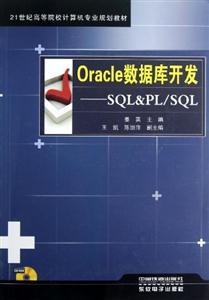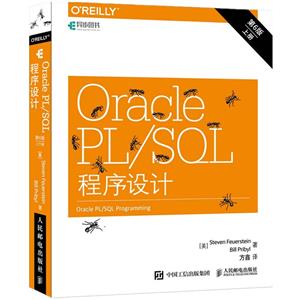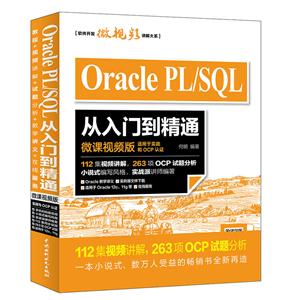
作者:(美)弗伊尔斯坦(StevenFeue
页数:1340
出版社:东南大学出版社
出版日期:2015
ISBN:9787564153472
电子书格式:pdf/epub/txt
内容简介
本书是最新第6版更新版,从PL/SQL编程、PL/SQL程序结构、PL/SQL程序数据、PL/SQL中的SQL、PL/SQL应用构建、高级PL/SQL主题这6个方面详细系统地讨论了PL/SQL以及如何有效地使用它。本书能够帮助你充分利用PL/SQL来解决数据库开发中遇到的各种问题,引导你掌握各种构建应用的技巧和技术,以便使你编写出高效、可维护的代码。
作者简介
Steven Feuerstein被认为是世界上Oracle PL/SQL语言方面的权威专家之一。Steven从1990年就开始编写PL/SQL语言相关书籍并为开发人员进行培训。他在这个方向出版了十本书,包括《Oracle PL/SQL Best Practices》。
BillPribyl是一名作家、讲师和软件咨询师。他是《LearningOracle PL/SQL》的作者,也是《Oracle PL/SQL Programming)>和《Oracle PL/SQL Language Pocket Reference》的作者之一。
本书特色
本书是最新第6版更新版,从pl/sql编程、pl/sql程序结构、pl/sql程序数据、pl/sql中的sql、pl/sql应用构建、高级pl/sql主题这6个方面详细系统地讨论了pl/sql以及如何有效地使用它。本书能够帮助你充分利用pl/sql来解决数据库开发中遇到的各种问题,引导你掌握各种构建应用的技巧和技术,以便使你编写出高效、可维护的代码。
目录
preface
partl. programming in pl/sql
1. introduction to pl/sql
what is pl/sql?
the origins of pl/sql
the early years of pl/sql
improved application portability
improved execution authority and transaction integrity
humble beginnings, steady improvement
so this is pl/sql
integration with sql
control and conditional logic
when things go wrong
about pl/sql versions
oracle database 12c new pl/sql features
resources for pl/sql developers
the o’reilly pl/sql series
pl/sql on the internet
some words of advice
don’t be in such a hurry!
don’t be afraid to ask for help
take a creative, even radical approach
2. creating and running pl/sql code
navigating the database
creating and editing source code
sql最plus
starting up sql最plus
running a sql statement
running a pl/sql program
running a script
what is the “current directory”?
other sql最plus tasks
error handling in sql最plus
why you will love and hate sql最plus
performing essential pl/sql tasks
creating a stored program
executing a stored program
showing stored programs
managing grants and synonyms for stored programs
dropping a stored program
hiding the source code of a stored program
editing environments for pl/sql
calling pl/sql from other languages
c: using oracle’s precompiler (pro最c)
java: using jdbc
perl: using perl dbi and dbd::oracle
php: using oracle extensions
pl/sql server pages
and where else?
3. language fundamentals
pl/sql block structure
anonymous blocks
named blocks
nested blocks
scope
qualify all references to variables and columns in sql statements
visibility
the pl/sql character set
identifiers
reserved words
whitespace and keywords
literals
nulls
embedding single quotes inside a literal string
numeric literals
boolean literals
the semicolon delimiter
……
partl. programming in pl/sql
1. introduction to pl/sql
what is pl/sql?
the origins of pl/sql
the early years of pl/sql
improved application portability
improved execution authority and transaction integrity
humble beginnings, steady improvement
so this is pl/sql
integration with sql
control and conditional logic
when things go wrong
about pl/sql versions
oracle database 12c new pl/sql features
resources for pl/sql developers
the o’reilly pl/sql series
pl/sql on the internet
some words of advice
don’t be in such a hurry!
don’t be afraid to ask for help
take a creative, even radical approach
2. creating and running pl/sql code
navigating the database
creating and editing source code
sql最plus
starting up sql最plus
running a sql statement
running a pl/sql program
running a script
what is the “current directory”?
other sql最plus tasks
error handling in sql最plus
why you will love and hate sql最plus
performing essential pl/sql tasks
creating a stored program
executing a stored program
showing stored programs
managing grants and synonyms for stored programs
dropping a stored program
hiding the source code of a stored program
editing environments for pl/sql
calling pl/sql from other languages
c: using oracle’s precompiler (pro最c)
java: using jdbc
perl: using perl dbi and dbd::oracle
php: using oracle extensions
pl/sql server pages
and where else?
3. language fundamentals
pl/sql block structure
anonymous blocks
named blocks
nested blocks
scope
qualify all references to variables and columns in sql statements
visibility
the pl/sql character set
identifiers
reserved words
whitespace and keywords
literals
nulls
embedding single quotes inside a literal string
numeric literals
boolean literals
the semicolon delimiter
……















